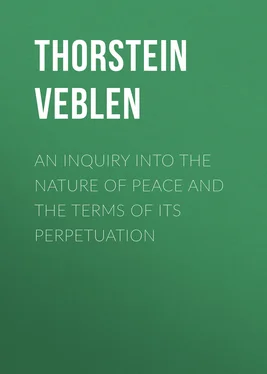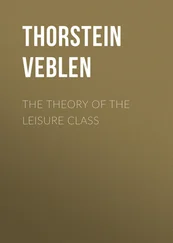Thorstein Veblen - An Inquiry into the Nature of Peace and the Terms of Its Perpetuation
Здесь есть возможность читать онлайн «Thorstein Veblen - An Inquiry into the Nature of Peace and the Terms of Its Perpetuation» — ознакомительный отрывок электронной книги совершенно бесплатно, а после прочтения отрывка купить полную версию. В некоторых случаях можно слушать аудио, скачать через торрент в формате fb2 и присутствует краткое содержание. Жанр: foreign_antique, Политика, Юриспруденция, foreign_edu, на английском языке. Описание произведения, (предисловие) а так же отзывы посетителей доступны на портале библиотеки ЛибКат.
- Название:An Inquiry into the Nature of Peace and the Terms of Its Perpetuation
- Автор:
- Жанр:
- Год:неизвестен
- ISBN:нет данных
- Рейтинг книги:5 / 5. Голосов: 1
-
Избранное:Добавить в избранное
- Отзывы:
-
Ваша оценка:
- 100
- 1
- 2
- 3
- 4
- 5
An Inquiry into the Nature of Peace and the Terms of Its Perpetuation: краткое содержание, описание и аннотация
Предлагаем к чтению аннотацию, описание, краткое содержание или предисловие (зависит от того, что написал сам автор книги «An Inquiry into the Nature of Peace and the Terms of Its Perpetuation»). Если вы не нашли необходимую информацию о книге — напишите в комментариях, мы постараемся отыскать её.
An Inquiry into the Nature of Peace and the Terms of Its Perpetuation — читать онлайн ознакомительный отрывок
Ниже представлен текст книги, разбитый по страницам. Система сохранения места последней прочитанной страницы, позволяет с удобством читать онлайн бесплатно книгу «An Inquiry into the Nature of Peace and the Terms of Its Perpetuation», без необходимости каждый раз заново искать на чём Вы остановились. Поставьте закладку, и сможете в любой момент перейти на страницу, на которой закончили чтение.
Интервал:
Закладка:
In so far as it is of a material nature the benefit which the constituted authorities so engage to contribute to the common good, or in other words to confer on the common man, falls under two heads: defense against aggression from without; and promotion of the community's material gain. It is to be presumed that the constituted authorities commonly believe more or less implicitly in their own professions in so professing to serve the needs of the common man in these respects. The common defense is a sufficiently grave matter, and doubtless it claims the best affections and endeavour of the citizen; but it is not a matter that should claim much attention at this point in the argument, as bearing on the service rendered the common man by the constituted authorities, taken one with another. Any given governmental establishment at home is useful in this respect only as against another governmental establishment elsewhere. So that on the slightest examination it resolves itself into a matter of competitive patriotic enterprise, as between the patriotic aspirations of different nationalities led by different governmental establishments; and the service so rendered by the constituted authorities in the aggregate takes on the character of a remedy for evils of their own creation. It is invariably a defense against the concerted aggressions of other patriots. Taken in the large, the common defense of any given nation becomes a detail of the competitive struggle between rival nationalities animated with a common spirit of patriotic enterprise and led by authorities constituted for this competitive purpose.
Except on a broad basis of patriotic devotion, and except under the direction of an ambitious governmental establishment, no serious international aggression is to be had. The common defense, therefore, is to be taken as a remedy for evils arising out of the working of the patriotic spirit that animates mankind, as brought to bear under a discretionary authority; and in any balance to be struck between the utility and disutility of this patriotic spirit and of its service in the hands of the constituted authorities, it will have to be cancelled out as being at the best a mitigation of some of the disorders brought on by the presence of national governments resting on patriotic loyalty at large.
But this common defense is by no means a vacant rubric in any attempted account of modern national enterprise. It is the commonplace and conclusive plea of the dynastic statesmen and the aspiring warlords, and it is the usual blind behind which events are put in train for eventual hostilities. Preparation for the common defense also appears unfailingly to eventuate in hostilities. With more or less bona fides the statesmen and warriors plead the cause of the common defense, and with patriotic alacrity the common man lends himself to the enterprise aimed at under that cover. In proportion as the resulting equipment for defense grows great and becomes formidable, the range of items which a patriotically biased nation are ready to include among the claims to be defended grows incontinently larger, until by the overlapping of defensive claims between rival nationalities the distinction between defense and aggression disappears, except in the biased fancy of the rival patriots.
Of course, no reflections are called for here on the current American campaign of "Preparedness." Except for the degree of hysteria it appears to differ in no substantial respect from the analogous course of auto-intoxication among the nationalities of Europe, which came to a head in the current European situation. It should conclusively serve the turn for any self-possessed observer to call to mind that all the civilised nations of warring Europe are, each and several, convinced that they are fighting a defensive war.
The aspiration of all right-minded citizens is presumed to be "Peace with Honour." So that first, as well as last, among those national interests that are to be defended, and in the service of which the substance and affections of the common man are enlisted under the aegis of the national prowess, comes the national prestige, as a matter of course. And the constituted authorities are doubtless sincere and single-minded in their endeavors to advance and defend the national honour, particularly those constituted authorities that hold their place of authority on grounds of fealty; since the national prestige in such a case coalesces with the prestige of the nation's ruler in much the same degree in which the national sovereignty devolves upon the person of its ruler. In so defending or advancing the national prestige, such a dynastic or autocratic overlord, together with the other privileged elements assisting and dependent on him, is occupied with his own interest; his own tenure is a tenure by prestige, and the security of his tenure lies in the continued maintenance of that popular fancy that invests his person with this national prestige and so constitutes him and his retinue of notables and personages its keeper.
But it is uniformly insisted by the statesmen—potentates, notables, kings and mandarins—that this aegis of the national prowess in their hands covers also many interests of a more substantial and more tangible kind. These other, more tangible interests of the community have also a value of a direct and personal sort to the dynasty and its hierarchy of privileged subalterns, in that it is only by use of the material forces of the nation that the dynastic prestige can be advanced and maintained. The interest of such constituted authorities in the material welfare of the nation is consequently grave and insistent; but it is evidently an interest of a special kind and is subject to strict and peculiar limitations. The common good, in the material respect, interests the dynastic statesman only as a means to dynastic ends; that is to say, only in so far as it can be turned to account in the achievement of dynastic aims. These aims are "The Kingdom, the Power and the Glory," as the sacred formula phrases the same conception in another bearing.
That is to say, the material welfare of the nation is a means to the unfolding of the dynastic power; provided always that this material welfare is not allowed to run into such ramifications as will make the commonwealth an unwieldy instrument in the hands of the dynastic statesmen. National welfare is to the purpose only in so far as it conduces to political success, which is always a question of warlike success in the last resort. The limitation which this consideration imposes on the government's economic policy are such as will make the nation a self-sufficient or self-balanced economic commonwealth. It must be a self-balanced commonwealth at least in such measure as will make it self-sustaining in case of need, in all those matters that bear directly on warlike efficiency.
Of course, no community can become fully self-sustaining under modern conditions, by use of the modern state of the industrial arts, except by recourse to such drastic measures of repression as would reduce its total efficiency in an altogether intolerable degree. This will hold true even of those nations who, like Russia or the United States, are possessed of extremely extensive territories and extremely large and varied resources; but it applies with greatly accentuated force to smaller and more scantily furnished territorial units. Peoples living under modern conditions and by use of the modern state of the industrial arts necessarily draw on all quarters of the habitable globe for materials and products which they can procure to the best advantage from outside their own special field so long as they are allowed access to these outlying sources of supply; and any arbitrary limitation on this freedom of traffic makes the conditions of life that much harder, and lowers the aggregate efficiency of the community by that much. National self-sufficiency is to be achieved only by a degree of economic isolation; and such a policy of economic isolation involves a degree of impoverishment and lowered efficiency, but it will also leave the nation readier for warlike enterprise on such a scale as its reduced efficiency will compass.
Читать дальшеИнтервал:
Закладка:
Похожие книги на «An Inquiry into the Nature of Peace and the Terms of Its Perpetuation»
Представляем Вашему вниманию похожие книги на «An Inquiry into the Nature of Peace and the Terms of Its Perpetuation» списком для выбора. Мы отобрали схожую по названию и смыслу литературу в надежде предоставить читателям больше вариантов отыскать новые, интересные, ещё непрочитанные произведения.
Обсуждение, отзывы о книге «An Inquiry into the Nature of Peace and the Terms of Its Perpetuation» и просто собственные мнения читателей. Оставьте ваши комментарии, напишите, что Вы думаете о произведении, его смысле или главных героях. Укажите что конкретно понравилось, а что нет, и почему Вы так считаете.












